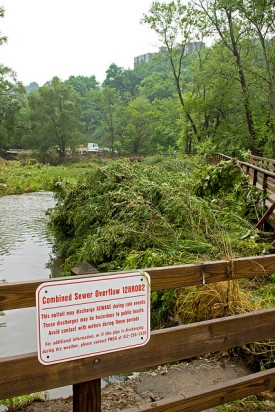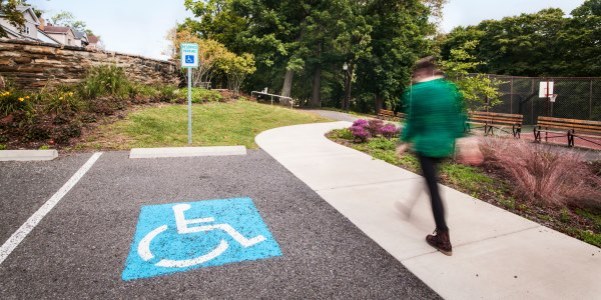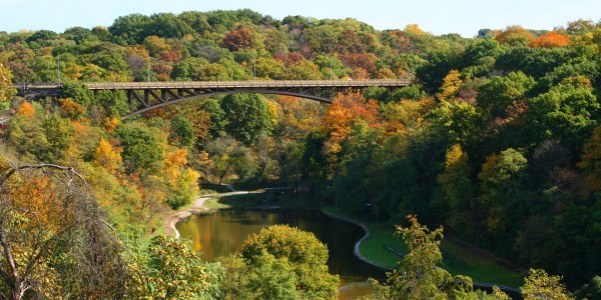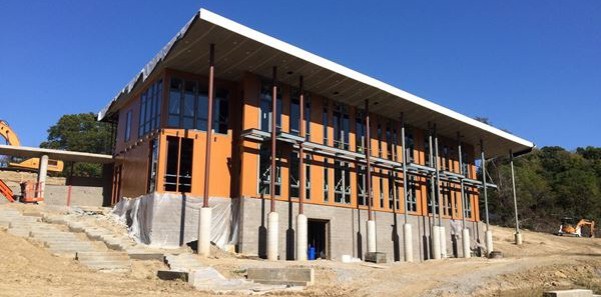Pittsburghers, opportunity is just around the river bend.

Nine Mile Run in Frick Park, a favorite spot of park visitors, is also often flooded by combined sewers.
For older cities such as ours, stormwater poses a serious challenge to our archaic sewer system. Every major rain event results in combined sewer overflow (CSO) and unclean rivers.
This isn’t a new problem. Groups all across the region have been making strides to address this issue through green infrastructure (e.g. rain gardens and bioswales), more conscientious development, and investments in our parks and green spaces. These efforts have the two-fold benefit of making our communities better while quelling stormwater.
Pittsburghers are ready to take these efforts to the next level. Fortunately for us, there’s a multi-billion-dollar opportunity at our fingertips. Recently, however, an uninspired plan to use this money would mean not only a missed opportunity, but would actually negatively impact the assets that we’ve all worked for years to gain. This plan, revealed by the Clean Rivers Campaign of Pittsburgh United last week, would mean an investment in over a dozen “drop shafts,” or underground tunnels, disrupting some of the most well-loved spots in Pittsburgh: our riverfront parks.
There are better, proven solutions. Wise partnerships, expert planning, an active and informed community, and the will to work together for a healthier and more vibrant city is a very powerful force for change that benefits us all. Proof of this is in the parks:
McKinley Park
After years of inattention, this 79-acre community park underwent a $250,000 makeover. The completed project includes an entrance area parking lot surfaced with porous asphalt that allows storm water to be absorbed into the ground; rain gardens; and accessible walkways from the street to the playground and the basketball court. A stone wall dating from the 1930s at the entrance of the park was also carefully restored to historic detail.

Porous pavement, rain gardens, and accessible entrance at McKinley Park.
Panther Hollow
For more than a decade, we’ve been working alongside ALCOSAN, PWSA, and the City of Pittsburgh to heal this ecologically important area. This long-term project includes planting trees; addressing erosion; installing meadows, rain gardens, infiltration trenches, and other green infrastructure; and collaborating on sustainable projects at the Bob O’Connor Golf Course. Most recently, the $2.5 million restoration of the Westinghouse Memorial ties together historic restoration with stormwater management.

Iconic Panther Hollow in Schenley Park, the focus of years of restoration projects.
Frick Environmental Center
Among many exciting aspects of this project, the state-of-the-art Center will be net-zero water, meaning stormwater must be captured on site and the building won’t depend wholly on municipal water. Built in partnership with the City of Pittsburgh, the Center will capture water from the roof and in a 15,000-gallon underground cistern to be used within the building and on the grounds, eventually replenishing park streams.

The new Center, October 20, 2015.
There is an abundance of parkland for critical, large-scale and strategically placed green infrastructure; these spaces can and should play a vital role in water quality and stormwater management. Green efforts are already working in and for our communities. Let’s pursue an integrated approach that includes parks, rights of way, transportation, and residents’ input.
Let’s keep Pittsburgh on the path of world-renowned green innovation.
